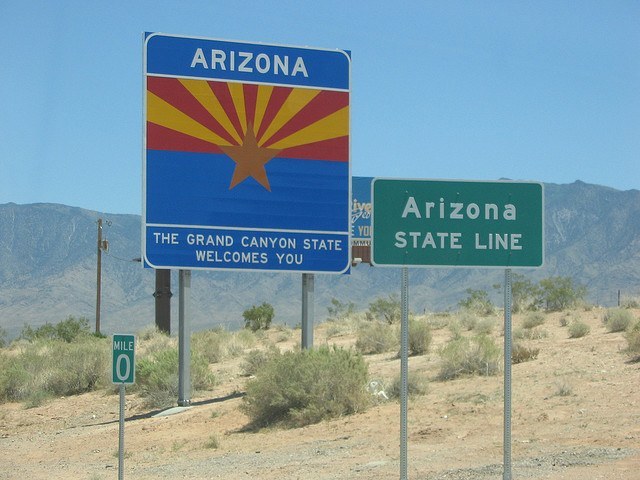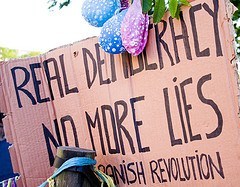
Unusual Election Reform: Are Americans Open to Fundamental Reform of Election Methodologies?
Democracy, elections, and voting at Democracy Chronicles
An attempt at initiating a rare form of election methodology has lost steam in Arizona. The ‘top two’ open primary or ‘non-partisan blanket primary’ is used in a few other places but it seems Arizona is not going down this road. On the really useful website, Ballot Access News, there was a recent post about the decision titled ‘Arizona League of Women Voters Studies “Top-Two”, Concludes that it Ought to be Opposed’. Take a look:
“An initiative to place a top-two open primary proposal will probably succeed in getting on the November 2012 Arizona ballot. The Arizona League of Women Voters has been studying the proposal for the past several months, and has concluded that the measure is not good policy and should be defeated.
The Arizona League is only the second state League of Women Voters that has studied top-two systems. The Washington state League also studied it and also determined that it should be defeated. The California League has never studied top-two systems.”
There is more information about non-partisan blanket primaries on the Wikipedia page found here.  The voting system is described as follows:
The voting system is described as follows:
A nonpartisan blanket primary (also known as a qualifying primary, top-two primary, Louisiana primary, Cajun primary or jungle primary) is a primary election in which all candidates for elected office run in the same primary regardless of political party. Under this system, the top two candidates who receive the most votes advance to the next round, as in a runoff election. However, there is no separate nomination process for candidates before the first round, and parties cannot thin the field using their own internal processes (such as a convention). Similarly, it is entirely possible that two candidates of the same party could advance to the second round.
Wikipedia also has some interesting background on the history of the issue at the Supreme Court:
Because voters can vote in the first round for a candidate from any political party, the nonpartisan blanket primary has been compared to the original blanket primary used briefly in California, which in 2000 was ruled unconstitutional in California Democratic Party v. Jones because it forced political parties to associate with candidates they did not endorse. However, the nonpartisan blanket primary disregards party preference in determining the two candidates to advance to the general election, and for that reason has been ruled facially constitutional by the Supreme Court in the 2008 decision Washington State Grange v. Washington State Republican Party.
Chief Justice Roberts concurred in the 2008 decision, “If the ballot is designed in such a manner that no reasonable voter would believe that the candidates listed there are nominees or members of, or otherwise associated with, the parties the candidates claimed to “prefer,” the I–872 primary system would likely pass constitutional muster.” Each candidate for partisan office can state a political party that he or she prefers. Ballots also must feature a disclaimer to voters that candidate’s preference does not imply that the candidate is nominated or endorsed by the party, or that the party approves of or associates with that candidate. Ballots with candidate preference are now used statewide in Washington State and California.
There is also a look at the history of non-partisan blanket primaries in Louisiana:
Until recently, this format has only been used for regular elections in the U.S. state of Louisiana. There is a second round (runoff) between the top two candidates if no candidate wins a simple majority (more than half of the votes) in the first round of balloting. This happens more often with open seats, as incumbents more easily win majorities. The runoff constitutes the general election under Louisiana law even if the general election had two candidates of the same party, a phenomenon which frequently occurs. The only labels originally permitted under the Louisiana law were Democrat, Republican, and No Party; however, as of 2008 the labels of any “registered political party” may be used. The primary has been used in statewide elections since 1975.
Washington State apparently has a similar system. California, Texas, Alaska and Oregon have flirted with using the process on limited basis as well. Lastly, as well as problems with the legality of the system, there has been some other criticism of the voting method:
Critics of the nonpartisan blanket primary object to calling it an open primary, and one judge in California even barred proponents from using the term in their advertisements. Additionally, critics also note the strong possibility of two candidates from the same party advancing to the second round; this becomes increasingly likely when one party runs drastically fewer candidates than another and thus faces less vote-splitting. Under the nonpartisan blanket primary, a party with two candidates and only 41% popular support would beat a party with three candidates and 59% popular support if voters split their votes evenly amongst candidates for their own party. The results of one study comparing the results in Washington state between the 2004 (closed) and 2008 (top two) primaries, indicate that the top two primary reduced the likelihood of running against a same party candidate and it reduced the likelihood that a strong incumbent would face a challenger from his or her own party.
The nonpartisan aspect means that political parties cannot control which candidates are allowed to use the party name. Partisan primaries allow for one candidate from each party to advance to the general election; no other candidate may use the party name in their campaign.
Political Science Professor Todd Donovan published an article in 2012 for the California Journal of Politics & Policy, called “The Top Two Primary: What Can California Learn from Washington?” Donovan was the only Expert Witness in favor of the top-two idea, for the as applied court challenge of Top-Two. His academic paper states, “The partisan structure of Washington’s legislature appears unaltered by the new primary system.” Donovan concluded, “The aggregate of all this did not add up to a legislature that looked different or functioned differently from the legislature elected under a partisan primary.”
In Washington State, major parties have resorted to an alternate process of party nomination for partisan legislative and county administrative positions. This ensures that one official party candidate will be in the primary, theoretically reducing the risk of intra-party vote splits. However, the law does not allow nominations or endorsements by interest groups, political action committees, political parties, labor unions, editorial boards, or other private organizations to be printed on the ballot.
The indication of party “preference” as opposed to party affiliation opens the door for candidates to misrepresent their leanings or otherwise confuse voters. In 2008, a Washington gubernatorial candidate indicated party preference as “G.O.P.” instead of Republican. A public poll found that 25% of the public did not know that the two terms mean the same thing.
Leave a Reply